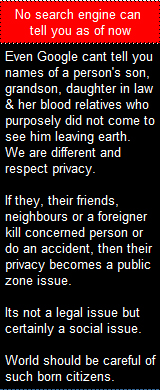Untitled Document
Your
Birthday |
|
Independence
Day
UN Day by type
UN
Day by date
International day
birthday of
Nobel Laureate ,
Philanthropist ,
Celebrity
Scientist, Innovator |
|
|
|
|
Untitled Document
| World
must know your Birthday |
Your
name here
If
you want your name here,
then donate Rs 1000/- pa
(USD 20 pa or its equivalent from any country) to Developed Nation Network
Turst
and together, we show the world that
you are Born as Philanthropist.
Its the attitude, not amount
which is important for you.
And donation can be on any day
Not necessarily your birthday.
Our
first target is Rs 13433000/- donation.
Because that is the value of the property
(as per Government of India authority)
which Bhau (father of founder)
donated to founder through Gift Deed.
Our donation target is
far bigger than Rs 13433000/-
So this amount if our first step.
If
you cant donate money, donate blood.
We cant share blood donor names but again, attitue is important.
Cant believe that such person's exist
in so called middle class families
When son purposely doesnt see father when
he is about to leave earth, When grandson purposely doesnt see grandfather
when he is about to leave earth, When daughter is law purposely doesnt
see father in law when he is about to leave earth and worst is when
they influence others not to see the person about to leave earth, then
their identity damages human identity.
Others
you influenced may be very good 99.99% time and someone may say that
they just made one mistake.
It is known to everybody that even good baloon bursts with just one
prick. So goodness baloon will burst if people know this real life fact.
No
names shared because we respect privacy, but if they KILL the other
son of the person who left earth directly or through accident which
is hard to know who was behind the accident (an Indian or someone from
neighbouring country or far off country), then not just their names,
but name of a person who said about Blood Bath on 11th July 2013, name
of person who talked not good about police on mobile, name of a person
who was not in society meeting but signed at home an important decision
in 2008 plus many other things will be open to people across the world..
|
|
|
|
Untitled Document
| Corp,
NGOs |
| |
|
| Brands |
| |
|
|
| Countries,
islands |
| |
|
|
|
Products
are Brands
Responsible & Caring Brands are Sustainable |

Two
commom things for humans in any continent in the world
Life & Death |
 |